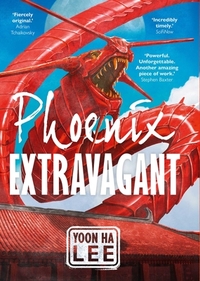Take a photo of a barcode or cover
I love Phoenix Extravagant with all my heart and felt extremely sad to finish the book and leave Hwaguk behind. I loved everything but mostly the characters hold a special place in my heart. They are so vibrant and alive. I had moments when I laughed out loud (which is extremely rare for me) with Jebi and many when I cried. I felt so invested in their story. Moreover, if like me you have been studying Korean and are interested in Korean history, you will find hidden depths in this book. I highly recommend it.
“Gyen Jebi isn’t a fighter or a subversive. They just want to paint.
One day they’re jobless and desperate; the next, Jebi finds themself recruited by the Ministry of Armor to paint the mystical sigils that animate the occupying government’s automaton soldiers.“
My first thought was that this was inspired by China, maybe HongKong, but I adjusted that thought to Korea, after having come across a Kimchi pot. And that turned out to be right, when I looked up the author‘s website.
“It’s about a nonbinary painter teaming up with a pacifist mecha dragon against an evil empire (as one does), and it takes place in a magical version of Korea during the Japanese occupation.“
I liked the setting of a magical realm based on real countries. The „depths of the Razanei government’s horrifying crimes“ weren‘t quite as horrifying as I had expected. Ok, the creation of the pigments was a little horrifying, if you have an appreciation of art.
Fascinating dragon. I would have loved for Arazi’s character to have been developed more deeply. Alas, with the story told purely from Jebi‘s POV, that wasn‘t possible. I would also have liked to see more of Jebi’s particular brand of magic. And to have seen Jebi setting other automatons free. It almost looked as if they would do it once or twice...
Neither the conquered Hwaguk or the Razanei were purely black or white, there were nuances that kept it multifaceted. The characters were depicted with enough depth to make them feel real. It didn‘t make it easier to like one or dislike the other. No cardboard cutouts in this novel. Bongsunga and Hak were prime examples of that dichotomy.
I enjoyed the light romance. Vei was my favourite character. And her family were great side characters. Jebi wasn‘t the smartest or most aware cookie. I think some might find Jebi annoying in their ineptness and rather unpolitical stance regarding the conflict in their country. The childlike naivety was rather charming for me.
So there is plenty of potential for a possible sequel. Fingers crossed. Which I would read, although it took me a good while to get through this book. I enjoyed the writing, it just wasn‘t compelling enough to drag me through the story at a higher speed. Despite the plot it was a rather chilled affair for me.
I received this free e-copy from the publisher/author via NetGalley, in exchange for an honest review, thank you! I am late, I know, I know....
One day they’re jobless and desperate; the next, Jebi finds themself recruited by the Ministry of Armor to paint the mystical sigils that animate the occupying government’s automaton soldiers.“
My first thought was that this was inspired by China, maybe HongKong, but I adjusted that thought to Korea, after having come across a Kimchi pot. And that turned out to be right, when I looked up the author‘s website.
“It’s about a nonbinary painter teaming up with a pacifist mecha dragon against an evil empire (as one does), and it takes place in a magical version of Korea during the Japanese occupation.“
I liked the setting of a magical realm based on real countries. The „depths of the Razanei government’s horrifying crimes“ weren‘t quite as horrifying as I had expected. Ok, the creation of the pigments was a little horrifying, if you have an appreciation of art.
Fascinating dragon. I would have loved for Arazi’s character to have been developed more deeply. Alas, with the story told purely from Jebi‘s POV, that wasn‘t possible. I would also have liked to see more of Jebi’s particular brand of magic. And to have seen Jebi setting other automatons free. It almost looked as if they would do it once or twice...
Neither the conquered Hwaguk or the Razanei were purely black or white, there were nuances that kept it multifaceted. The characters were depicted with enough depth to make them feel real. It didn‘t make it easier to like one or dislike the other. No cardboard cutouts in this novel. Bongsunga and Hak were prime examples of that dichotomy.
I enjoyed the light romance. Vei was my favourite character. And her family were great side characters. Jebi wasn‘t the smartest or most aware cookie. I think some might find Jebi annoying in their ineptness and rather unpolitical stance regarding the conflict in their country. The childlike naivety was rather charming for me.
So there is plenty of potential for a possible sequel. Fingers crossed. Which I would read, although it took me a good while to get through this book. I enjoyed the writing, it just wasn‘t compelling enough to drag me through the story at a higher speed. Despite the plot it was a rather chilled affair for me.
I received this free e-copy from the publisher/author via NetGalley, in exchange for an honest review, thank you! I am late, I know, I know....
Set in a steampunk-infused fantasy country heavily inspired by Korea under Japanese occupation in the early 1900s, this story follows a nonbinary painter in their mid-20s who struggles to find work in the capital city of their homeland, Hwaguk. In desperation, Gyen Jebi, the artist, applies for a job in the Razanei occupational government. Their political sister throws them out of the house, and Jebi ends up working for the Ministry of Armor under a Razanei name. The Ministry of Armor is in charge of designing and upkeeping the automaton soldiers that form one branch of the military- but that's not all they do. Jebi quickly learns that Armor is developing a dragon automaton prototype, but something has gone wrong, and the previous lead artist on the project is dead. Not only that, but the magical processes used to bring automata to life are more horrifying that Jebi could have ever imagined. Soon they must decide what's more important: keeping their head down and earning a good wage under an attractive but dangerous boss; or smuggling some of the classified information out to the Hwagukian rebel forces. I absolutely loved the setting of this book, and the magic; I was less convinced by the characters and their motivations. In particular, there are a few emotional relationships in the book which either developed or devolved in ways that didn't make sense to me. The ending is also interestingly abrupt for a stand alone novel. I still recommend it, but with caveats.
adventurous
medium-paced
Plot or Character Driven:
A mix
Strong character development:
Yes
Loveable characters:
Yes
Diverse cast of characters:
Yes
Flaws of characters a main focus:
Yes
Finally read this 6 months later than I intended to!
Rep: Nonbinary queer BIPOC MC (asian coded), biracial queer love interest, bisexual female side character, BIPOC cast of characters, queer-normative world.
CWs: Blood, confinement (to rooms/cell), death, murder, sexual content, torture, violence, grief, xenophobia.
Rep: Nonbinary queer BIPOC MC (asian coded), biracial queer love interest, bisexual female side character, BIPOC cast of characters, queer-normative world.
CWs: Blood, confinement (to rooms/cell), death, murder, sexual content, torture, violence, grief, xenophobia.
Graphic: Confinement, Death, Sexual content, Torture, Violence, Blood, Murder
Moderate: Xenophobia, Grief
I apologise for being rude, but if you didn't like this book, you are probably looking at it from a white SFF perspective.
A beautiful unscrolling of worldbuilding based quite poignantly on the Japanese occupation of Korea, Phoenix Extravagant is a delicious story that I regret reading in audiobook because I really want a physical copy now.
Yoon Ha Lee is to me what Murakami is to his edgelord fanbase. You don't always understand where he is going with his plot, but it is quite an enjoyable ride to get there. The characters felt stoic in the way of a good historical. But I found Jebi, Bongsunga and Vei so relatable. Even the possible 'villain.' The topic of colonisation was handled as only someone from a colonised country can handle it. And Arazi, the dragon was magical and wonderful. I loved his voice. Emily Woo Zeller really did a great job with the audiobook. And now I need to shove around my budget to make room for this book!
Read for Book Club Hex Libris organised on Instagram by my friend @_hex_libris
A beautiful unscrolling of worldbuilding based quite poignantly on the Japanese occupation of Korea, Phoenix Extravagant is a delicious story that I regret reading in audiobook because I really want a physical copy now.
Yoon Ha Lee is to me what Murakami is to his edgelord fanbase. You don't always understand where he is going with his plot, but it is quite an enjoyable ride to get there. The characters felt stoic in the way of a good historical. But I found Jebi, Bongsunga and Vei so relatable. Even the possible 'villain.' The topic of colonisation was handled as only someone from a colonised country can handle it. And Arazi, the dragon was magical and wonderful. I loved his voice. Emily Woo Zeller really did a great job with the audiobook. And now I need to shove around my budget to make room for this book!
Read for Book Club Hex Libris organised on Instagram by my friend @_hex_libris
Thank you to NetGalley and the publisher for providing me with a free copy of this book in exchange for an honest review.
This was my first foray into Yoon Ha Lee’s work and all I can say is I can’t wait to explore more of his work because I really loved this! It is so very different to much of the other fantasy I’ve read, but because of that it felt so refreshing and new. And the nonbinary/female enemies to lovers relationship at the core of this story SPARKED SO MUCH JOY OMG I LOVE TO SEE IT.
Phoenix Extravagant is not your usual fantasy. We don’t follow a hero: instead, we follow an artist, slightly naive, oblivious to the world outside their art, and really just wanting to get on with their life outside of war. This passivity isn’t usually something you see in fantasy, particularly in a fantasy book about colonisation and rebellion. The book follows this artist, Gyen Jebi, as they are hired by the ruling Razanei Ministry of Armour to paint sigils that power their army of automaton. But after they discover how the paint is created, they feel forced to act, by stealing the Ministry of Armour’s automaton dragon of course!
This is a book full of very contrasting elements, and it made for a very unusual read, but one that felt so new and unique, fun and fresh. We see the book from the perspective of someone who doesn’t want to get involved in a rebellion, who doesn’t want to fight or kill and kind of just wants to get on with their life, so they get a job with the enemy to pay their bills. This is contrasted with the exploration of identity, colonisation and war, bringing us the unusual story of someone from the conquered class who doesn’t want to fight back themselves to get their country back. We see in Jebi the way the conquering nation are able to assimilate, manipulating the Hwaguk into giving up their names and their culture. The horrific nature of the magic system really exemplifies this, using cultural erasure to create the very weapon used to enforce the rule over Hwaguk is just horrific on so many different levels. So instead of in the main character, it is in Jebi’s sister, Bongsunga, that we see the rebel fighter who is willing to die to her country back. This makes for a very interesting and complex sibling relationship at the heart of this book, one that involves betrayal on both sides.
Alongside Jebi, we have another pacifist at the centre of this novel, who is of course Arazi the automaton dragon. Arazi, a war machine built by the Razan to destroy their enemies, who wants nothing to do with it. Arazi is such a sweet dragon for a creature created for such monstrosities and I adored the emphasis put on his consent and choice, and Jebi’s efforts to allow the dragon choice and free will as much as possible.
I really loved the juxtaposition of the steampunky, scifi nature of this fantasy alongside this more mystical, fairytale sense of freedom in the story. The contrast of this automaton dragon, and the mystical way he can fly; this felt most especially freeing in the way this book ended. I won’t say anything for spoilers, but I loved that we ended on a more fairytale-esque note than other elements of the book would suggest.
I want to end with talking about the relationship between Jebi and the prime duelist, Vei, because I just loved it. I think I must’ve been smiling like a fool the whole way through at seeing such a brilliant nb/f relationship at the heart of a fantasy book, it just made me so full of joy!! These two start with a mainly physical relationship but then grow to trust each other and suddenly the fire with which they fight for the other, the lack of control when the other is in danger, I just love to see it. Lee writes with such a simple style of writing I feel, it’s not full of huge detailed paragraphs about worldbuilding, about magic, about politics, or about the relationship. And this more simple style of writing somehow felt more powerful than if we’d had pages and pages of relationship development. Instead, the simplest sentences held the most power. It makes you pay attention to actions and what’s actually happening to see what is most important, and this felt particularly well done when showing off the relationship between Jebi and Vei.
I really loved this book. It looks at colonisation and war from a very different perspective than you usually see in fantasy. Instead of following a hero, we follow one of the bystanders impacted by war. It felt so fresh and unique and it really emphasised some of the mechanisms colonisers use to control those they conquer.
This was my first foray into Yoon Ha Lee’s work and all I can say is I can’t wait to explore more of his work because I really loved this! It is so very different to much of the other fantasy I’ve read, but because of that it felt so refreshing and new. And the nonbinary/female enemies to lovers relationship at the core of this story SPARKED SO MUCH JOY OMG I LOVE TO SEE IT.
Phoenix Extravagant is not your usual fantasy. We don’t follow a hero: instead, we follow an artist, slightly naive, oblivious to the world outside their art, and really just wanting to get on with their life outside of war. This passivity isn’t usually something you see in fantasy, particularly in a fantasy book about colonisation and rebellion. The book follows this artist, Gyen Jebi, as they are hired by the ruling Razanei Ministry of Armour to paint sigils that power their army of automaton. But after they discover how the paint is created, they feel forced to act, by stealing the Ministry of Armour’s automaton dragon of course!
This is a book full of very contrasting elements, and it made for a very unusual read, but one that felt so new and unique, fun and fresh. We see the book from the perspective of someone who doesn’t want to get involved in a rebellion, who doesn’t want to fight or kill and kind of just wants to get on with their life, so they get a job with the enemy to pay their bills. This is contrasted with the exploration of identity, colonisation and war, bringing us the unusual story of someone from the conquered class who doesn’t want to fight back themselves to get their country back. We see in Jebi the way the conquering nation are able to assimilate, manipulating the Hwaguk into giving up their names and their culture. The horrific nature of the magic system really exemplifies this, using cultural erasure to create the very weapon used to enforce the rule over Hwaguk is just horrific on so many different levels. So instead of in the main character, it is in Jebi’s sister, Bongsunga, that we see the rebel fighter who is willing to die to her country back. This makes for a very interesting and complex sibling relationship at the heart of this book, one that involves betrayal on both sides.
Alongside Jebi, we have another pacifist at the centre of this novel, who is of course Arazi the automaton dragon. Arazi, a war machine built by the Razan to destroy their enemies, who wants nothing to do with it. Arazi is such a sweet dragon for a creature created for such monstrosities and I adored the emphasis put on his consent and choice, and Jebi’s efforts to allow the dragon choice and free will as much as possible.
I really loved the juxtaposition of the steampunky, scifi nature of this fantasy alongside this more mystical, fairytale sense of freedom in the story. The contrast of this automaton dragon, and the mystical way he can fly; this felt most especially freeing in the way this book ended. I won’t say anything for spoilers, but I loved that we ended on a more fairytale-esque note than other elements of the book would suggest.
I want to end with talking about the relationship between Jebi and the prime duelist, Vei, because I just loved it. I think I must’ve been smiling like a fool the whole way through at seeing such a brilliant nb/f relationship at the heart of a fantasy book, it just made me so full of joy!! These two start with a mainly physical relationship but then grow to trust each other and suddenly the fire with which they fight for the other, the lack of control when the other is in danger, I just love to see it. Lee writes with such a simple style of writing I feel, it’s not full of huge detailed paragraphs about worldbuilding, about magic, about politics, or about the relationship. And this more simple style of writing somehow felt more powerful than if we’d had pages and pages of relationship development. Instead, the simplest sentences held the most power. It makes you pay attention to actions and what’s actually happening to see what is most important, and this felt particularly well done when showing off the relationship between Jebi and Vei.
I really loved this book. It looks at colonisation and war from a very different perspective than you usually see in fantasy. Instead of following a hero, we follow one of the bystanders impacted by war. It felt so fresh and unique and it really emphasised some of the mechanisms colonisers use to control those they conquer.
this isn’t a review, but it is very important to me, so i’m just gonna casually @ the reviewers of this book.
now, in case you didn’t know, i’m non-binary (agender) and use they/them pronouns, like this book’s protagonist (jebi). in a fuck of a lot of reviews, i’ve seen people say things varying from finding jebi’s use of exclusively they/them pronouns odd, to grammatically incorrect, to something that confused them, to something they had to get used to. nothing obviously transphobic, but honestly? i implore everyone who had that thought process or considered it a worthwhile critique/comment to make about this book to reassess the way comments like that would and will be interpreted by the non-binary and trans community. my identity is not something for you to “get used to”, and respecting my pronouns isn’t “odd” or “confusing”. this is inarguably true irl, but also something that takes priority in fiction. yes, non-binary people are only recently getting representation (particularly #ownvoices) in media. yes, a lot of people aren’t used to it. but implying that people who use they/them pronouns in literature are something to “get used to”, as opposed to simply another part of a character that should be accepted and moved on from without criticism, implies that there is something strange or wrong with those pronouns/that part of a person to begin with. also, it has nothing to do with the book. in a review about phoenix extravagant, unnecessary and possibly negative comments about jebi’s pronouns are completely unrelated and quite frankly, the insistence on including it anyway comes across as pretty messed up. respecting pronouns has nothing to do with writing style, plot, pacing, or even characterization/character development. it’s akin to saying “the character had blonde hair, which took a while for me to get used to”, only with a shitload of history and systematic marginalization surrounding it that being blonde doesn’t have. to be far more succinct than the long paragraph i just wrote, the end of is: do not imply that a character’s gender identity is something that requires getting used to. it is transphobic and uncalled for.
-
i saw this at the bookstore and am Deceased. i need to stop buying all these books dammit
now, in case you didn’t know, i’m non-binary (agender) and use they/them pronouns, like this book’s protagonist (jebi). in a fuck of a lot of reviews, i’ve seen people say things varying from finding jebi’s use of exclusively they/them pronouns odd, to grammatically incorrect, to something that confused them, to something they had to get used to. nothing obviously transphobic, but honestly? i implore everyone who had that thought process or considered it a worthwhile critique/comment to make about this book to reassess the way comments like that would and will be interpreted by the non-binary and trans community. my identity is not something for you to “get used to”, and respecting my pronouns isn’t “odd” or “confusing”. this is inarguably true irl, but also something that takes priority in fiction. yes, non-binary people are only recently getting representation (particularly #ownvoices) in media. yes, a lot of people aren’t used to it. but implying that people who use they/them pronouns in literature are something to “get used to”, as opposed to simply another part of a character that should be accepted and moved on from without criticism, implies that there is something strange or wrong with those pronouns/that part of a person to begin with. also, it has nothing to do with the book. in a review about phoenix extravagant, unnecessary and possibly negative comments about jebi’s pronouns are completely unrelated and quite frankly, the insistence on including it anyway comes across as pretty messed up. respecting pronouns has nothing to do with writing style, plot, pacing, or even characterization/character development. it’s akin to saying “the character had blonde hair, which took a while for me to get used to”, only with a shitload of history and systematic marginalization surrounding it that being blonde doesn’t have. to be far more succinct than the long paragraph i just wrote, the end of is: do not imply that a character’s gender identity is something that requires getting used to. it is transphobic and uncalled for.
-
i saw this at the bookstore and am Deceased. i need to stop buying all these books dammit
adventurous
emotional
reflective
medium-paced
Plot or Character Driven:
Plot
Strong character development:
Complicated
Loveable characters:
Complicated
Diverse cast of characters:
Yes
Flaws of characters a main focus:
Yes
“If standing on principle means that you lose the people those principles are meant to protect, what's the point?”
This may be the first science fiction book I have read where the main character uses they/them pronouns. It was so effortless. It’s nice. ✨
THIS BOOK IS A DELIGHT IF YOU’RE LOOKING TO GET LOST WITH AN ARTIST: it follows a non-binary artist in their twenties, a pacifist mecha dragon, a sexual tryst with an enemy prime-duelist, artists working for and resisting a rising empire, magical painting - what more could you ask for?
The mechanical dragon Arazi absolutely stole the show. Whenever the dragon wasn’t in the chapter I was missing them. 😅 I also loved the way Yoon Ha Lee based the plot in historical Korea-Japan-Western dynamics. It’s fascinating how this magical world explored colonialism and invasion!
I will definitely be seeking out more books by Yoon Ha Lee. 💯
adventurous
medium-paced
Plot or Character Driven:
Plot
Strong character development:
Yes
Loveable characters:
Yes
Diverse cast of characters:
Yes
Flaws of characters a main focus:
Yes
This was a super fun read! I absolutely love that the main character is not one that is particularly brave or adventurous, but does what they must out of necessity. I also really liked the bittersweet feeling it left me with.
adventurous
dark
funny
mysterious
tense
medium-paced
Plot or Character Driven:
A mix
Strong character development:
Complicated
Loveable characters:
Yes
Diverse cast of characters:
Yes
Flaws of characters a main focus:
Yes
I LOVED THIS BOOK!! ALTHO I FEEL SO BETRAYED BY THE LACK OF A SEQUEL AAA









